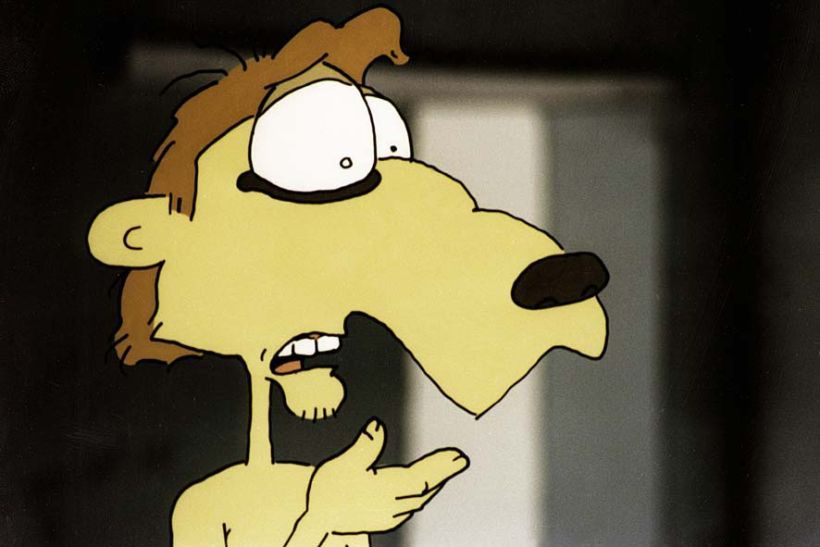
FUTTER © Carsten Strauch
Carsten Strauch, for several years now one of the most likeable figures on the short comedy scene, is the subject of our third filmmaker portrait. We hope that this may serve to open up the world of Carsten Strauch to non-German-speakers as well (depending of course on the availability of subtitled versions of his films), since up until now his audience has been largely limited to German-speaking viewers.Carsten Strauch, born in 1971 in Offenbach near Frankfurt/Main, has remained true to his hometown: from 1992 to 2000, he studied visual communication with a focus on film/AV at the Hochschule für Gestaltung (Academy of Art and Design) in Offenbach, completing the degree of “Diplom Designer” in 2001. During his studies, Strauch created some of the funniest short films of the past ten years, which could be viewed on many of Germany’s festival screens, as well as at the cinema as warm-ups and in short-film distribution.
His first film at HfG, and still perhaps his best-known work, was “Futter”. The story is about a shy lion whom the zookeepers have forgotten to feed and who goes about asking his fellow zoo inhabitants for something to eat. In response to the hungry predator’s query, “A piece of leg, perhaps?”, the antelope surprisingly answers “Sure, why not? What about a bit more as well?” – “Um, sure, if you don’t mind…” Strauch’s reserved animation conjures a rare brand of humour from this commingling of the kind of laid-back banter one would expect to find on the German alternative scene with the unforgiving laws of the animal world. His bold venture onto new ground was richly rewarded: with the German Film Award in Gold, the Friedrich Wilhelm Murnau Short Film Award and numerous festival appearances, primarily in German-speaking countries.
Strauch’s works, as can already be discerned in “Futter”, draw their life from the originality of their author. In many of his subsequent works as well, which include both films and radio plays, he is not only director and scriptwriter, but also speaker or main character. His protagonists are reserved and shy, polite and usually deliciously bewildered, expressed by their many “um”s and “you think so?”s. The humour seems to stem from the writer’s own somewhat reticent and modest personality.
Strauch’s favourite stylistic device is alienation, in particular by way of playing with genre expectations. Whether vampire film (“Die Nachbarn”), hospital soap (“Das Taschenorgan”) or submarine catastrophe (“Unter Druck”) – he likes to plant completely incongruous characters in the midst of a familiar film or television format as a means of generating situation comedy. His humour is dry, but never vacuous: a welcome change from RTL comedy shows or the box-office hits produced by German comedians Otto and Bully. Nevertheless, just like in Bully Herbig’s parodies, Strauch’s use of the alienation effect is quite German, with the humour often traceable to his own speech patterns (with his Offenbach dialect!) or to his deliberate echoes of the alternative communication culture in Germany, which is anything but universally understandable. This specific social grounding, which is largely responsible for the great success of Carsten Strauch’s short films, is not necessarily translatable into other languages and cultures.
What can be universally appreciated about his films, on the other hand, is their maker’s fecund imagination and sensitive timing, both of which set Strauch’s films apart from all the rest. This is the case even when they deal with themes that are not actually comical: such as xenophobia in “Coming Out”, with its victim a civil servant with an intractable Hitler moustache, or the question of how green spaces should be used in “Demokratie”, which Strauch treats in a laid back and post-ideological fashion.
A desire to dissect the culture of discourse on the alternative scene is also reflected in the award-winning short film made by Strauch’s fellow student and frequent team partner Piotr J. Lewandowski: “Heavy Pregnant”. Here, a woman in the 350th month of her pregnancy is a model of patience and understanding for her child, who simply doesn’t want to leave her body and instead calls the doctor on his cellphone to ask to postpone the birth. Strauch plays the lead and also contributed to the screenplay. A project like “Heavy Pregnant” demonstrates his penchant for offbeat characters – and his unbridled drive to entertain. Strauch, for whom there is nothing worse than a bored cinemagoer, gleans entertainment value both from the classic short film devices and a good feel for a snappy punch line. The medium plays a secondary role here: whether to choose animated film, feature film or advertisement is for Strauch less a matter of conviction than of pragmatism. Unlike in the case of artistic short film, whose makers are increasingly crossing the line into the arts scene, the comedians among the short filmmakers are much more strongly bound up with the advertising market. The latter is, however, notorious for monopolizing creative energies for its own ends and then, thanks to the power of money, refusing to release its hold. If funding is not available from other sources, a major talent like Carsten Strauch could soon be lost to the advertising industry – and the festivals would have to do without one of their wittiest figures.
Biography and filmography are available at www.carsten-strauch.de